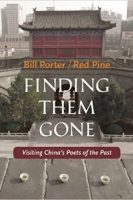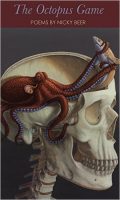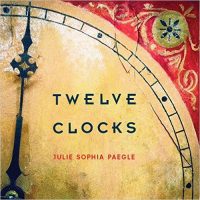February 17, 2016
Edited by David Sanders
Specimen Days
1796 —James Macpherson, poet, dies.
1836 —Gustavo Adolfo Bécquer, Spanish poet (d. 1870), is born.
1852— Micha Joseph Levenson, Hebrew poet, dies.
1856 —Heinrich Heine, German poet, dies at 58 in Paris.
1862 —Mori Ōgai, Japanese novelist and poet (d. 1922), is born.
1863 —Fyodor Sologub, Russian symbolist novelist and poet (d. 1927), is born.
1864 —Andrew Barton "Banjo" Paterson, NSW Australia, poet (Waltzing Matilda), is born.
1875 —Luis NF Varela, Brazilian romantic poet, dies at 33.
1877 —Henri Vandeputte, Belgian author/poet (L'homme Jeune), is born.
1878 —Jose Amador de los Rios, Spanish historian/poet, dies at 59.

From The Window
Well, this is awful weather;
Storming with rain and snow!
I sit at the window, staring
Into the darkness below.
A little glimmering brightness
Goes down the uncertain street—
A lantern, and a mother
With tired and stumbling feet.
I think it's eggs and flour
That the old lady has bought
To bake a cake for her daughter,
The lazy good-for-naught.
Yawning at home on the sofa,
She lies in front of the blaze—
The golden hair is falling
About her golden face.
—Heinrich Heine (1797–1856)
“Well, this is awful weather; / Storming with rain and snow! / I sit at the window, staring / Into the darkness below.”—Heinrich Heine (1797–1856)
World Poetry
Malayalam poet-lyricist O.N.V. Kurup Dead

Jnanpith awardee and eminent Malayalam poet, lyricist and environmentalist O.N.V. Kurup on Saturday passed away at a private hospital here following a cardiac arrest. He was 84 and is survived by wife, a son and daughter.
Jnanpith awardee and eminent Malayalam poet, lyricist and environmentalist O.N.V. Kurup passed away recently following a cardiac arrest.
Recent Reviews
Broad Range of Music Fuels Decatur Poet Kevin Young’s New Collection
by Jeremy Redmon

Kevin Young bobs his head to keep time when he reads his music-fueled poetry. He is no musician, but it appears as if he is playing an instrument as he sways back and forth in front of his audience, tapping his fingers on the lectern in rhythm with his poems. Music is a central ingredient of the award-winning poet’s work. When he sits down to write a poem at his home in Decatur, songs are usually playing in the background. With an iTunes library of about 35,000 songs, he has a lot to choose from.
Wrong Side of Town & The Boys of Bluehill
by Dean Browne
One of the stronger qualities of Wrong Side of Town is its spirit of gritty resilience, delight in the more outré aspect of ordinary happenings, and the regard for craft that typically elevates all this above the anecdotage seen in some poems therein. For all it ranges across scenes of filth and fetor the reader's takeaway is that something akin to moral goodness (distinct from 'goodiness') has been present all along in the rough, as it were—a basic stoicism, a hard-won, lenient, sometimes folksy wisdom. While it seldom shies from the seedier paraphernalia of contemporary urban existence – MDMA, Burger King, side-alleys of nightclubs, stinking taxis with casually racist drivers, to give a sample – its quiet refusal at the same time of cynicism and hardness, and how lightly worn the suffering is between its lines, are definite assets that demand recognition off the bat
The Body Palestine: A Review of Najwan Darwish’s Nothing More to Lose
by Adam Day
In the United States, Europe, and Asia you can visit formerly secret nuclear bunkers from the Cold War era as a tourist. Artists create projects around them; novelists write about them. These underground potential worlds of survival and living-as-usual, these uncanny and hybrid spaces, are now sources of entertainment and leisure, often occupied by mannequins. It’s difficult to imagine the smuggling tunnels of Gaza or Hamas bunkers one day becoming tourist attractions, or the West Bank barrier crumbling amid comradeship and celebration as at the fall of the Berlin Wall, bits of pocked and graffiti-marked concrete resting on living room shelves as mementos for some Swiss or Indonesian traveler. Perhaps sixty years ago, imagining the wane and collapse of the Cold War felt just as impossible. In Nothing More to Lose, his first collection of verse published in English, Najwan Darwish certainly seems skeptical.
“Made in China”
by Justin Wadland

In Finding Them Gone, the translator Red Pine, a.k.a. travel writer Bill Porter, calls on more than 40 ancient Chinese poets in 30 days. With three small porcelain cups and a flask of expensive bourbon, he crosses the country in search of places associated with the authors of his most beloved poems: usually their graves, but also former homes, memorial pavilions, and famous landmarks. Once located, regardless of the poet’s station in the literary afterlife, Porter pours his libations into the ground and then sips some himself.
Kevin Young bobs his head to keep time when he reads his music-fueled poetry.
Broadsides
Is Larkin’s Classic Poem “Water” a Work of Insincere Artifice?
by Alicia Stallings
Daisy Fried and I have never met, though we’ve both been in some of the same magazines, and have been Facebook friends for a while. We both post a fair amount about poetry, politics, and our kids. I recently posted this video of a Greek Orthodox Priest enthusiastically blessing the waters and his congregants for the feast of Epiphany (or Theophaneia). The Theophany commemorates the baptism of Jesus by John the Baptist in the river Jordan (when the dove comes down and the voice of God says "This is my Son with whom I am well pleased”). Upon my posting the video, Daisy and I almost simultaneously posted a reference to Philip Larkin's “Water”.
Poets Can't Do Anything Right. And Maybe That's Their Own Fault.
by Jon Stone
In one of the many memorable exchanges in the BBC's I, Claudius, a grovelling senator congratulates John Hurt’s Caligula for chewing out his colleagues. “How right you were, Jove,” he says, “to think of punishing them for celebrating the Battle of Actium.” “Well you see, Marcus, I had them both ways,” Caligula replies. “Because if they hadn’t, they would have insulted the God Augustus, my grandfather who won the battle.”
Is Philip Larkin’s poem “Water” a work of insincere artifice?
Drafts & Fragments
Watch This Sad Male Model Read His Poetry to You
by Catie L'Heureux
Just in time for Valentine's Day, behold: a handsome male model, who also knows heartbreak, is here for you with a sad breakup poem. In this video from the talent agency Wilhelmina, model and wordsmith Thomas Carlton takes his newly published book of poetry, When a Wolf Loves a Deer, to a wintry beach and reads an excerpt from the poem "Sand Castles." He employs beach metaphors and looks very pensive and sad.
Just in time for Valentine’s Day, behold: a handsome male model, who also knows heartbreak, is here for you with a sad breakup poem.
Poetry In the News
Announcing the 2016 Frost Medalist, Grace Schulman

The Poetry Society of America is honored to announce that Grace Schulman is the 2016 recipient of the organization's highest award, the Frost Medal, presented annually for distinguished lifetime achievement in poetry. Previous winners of this award include Wallace Stevens, Marianne Moore, Gwendolyn Brooks, Allen Ginsberg, Lucille Clifton, Charles Simic, Marilyn Nelson, and Kamau Brathwaite, the 2015 recipient.
The Poetry Society of America is honored to announce that Grace Schulman is the 2016 recipient of the organization’s highest award, the Frost Medal.
New Books
The Octopus Game by Nicky Beer
[Paperback] Carnegie Mellon, 80 pp., $15.95

Highly intelligent and a master of camouflage, the octopus is a creature destined to thrive in the poetic ecosystem. In The Octopus Game, the figure of the octopus shape-shifts and reinvents itself throughout ocean depths, tide pools, aquariums, gardens, movies, pulp novels, fine art, and nightmares. Nicky Beer acts as the strange documentarian recording the bizarre, beautiful, and disturbing habits of creatures for whom subterfuge and mimicry are a means of survival.
We Mammals in Hospitable Times by Jynne Dilling Martin
[Paperback] Carnegie Mellon, 56 pp., $15.95
We Mammals in Hospitable Times rushes headlong into an awfully dangerous planet: a spinning rock in outer space called Earth, where the smallest zoo animals are forgotten in fires, cats flee vacuums, lovers betray and abandon one another, basements flood as the globe warms, and an adopted parrot shrieks unfamiliar names. The narrator of these poems wavers between wary—“sometimes I mix up fear with hissed instructions”—and wide-eyed, wanting desperately to make sense of all this perplexing behavior. With this highly anticipated debut, Jynne Dilling Martin delivers poetry that offer armfuls of empathy, curiosity, and spiritual force.
Disquiet by John Witte
[Hardcover] University of Washington Press, 88 pp., $24.95

Disquiet is a collection of poems that utilizes natural phenomena―a bright beach, a fallen tree limb, the weight of gravity―to evoke and reflect upon memory and human experience. The poems are structurally innovative, each shaped around a central axis as they trace the speaker's growth from childhood to adulthood. Acute observations resonate throughout the book as its focus shifts from the natural world to the world of the made―the grocery cart or pie-case or microscope―to the world of visual art, and then back. The poems are subtly braided together in a way reminiscent of the invisible bonds that unite snowflakes or cells.
Salt Moon by Noel Crook
[Paperback] Southern Illinois University Press, 80 pp., $15.95
Throughout Salt Moon, Noel Crook forges the kind of tragic vision Howard Nemerov described as the mark of our finest poets: drawing on myth and memory, Crook’s fierce lyrics reveal a world that is at once “hopeless and beautiful . . . giving equal emphasis to both words.” Sacrifice and betrayal, parental love and patricide, unleashed desire and cornered despair—these antitheses fuel Crook’s Ovidian imagination, which ranges freely from Comanche raids in Texas to a slave plantation in North Carolina, from a carpet maker in Istanbul to beggars in Delhi, from her daughter’s hospital room to the war in Iraq. Rendered in unforgettable images, Salt Moon is that rare book which grows richer with each reading.
Twelve Clocks by Julie Sophia Paegle
[Paperback] University of Arizona Press, 104 pp., $16.95

From the fall of Troy recorded at the beginning of Western poetry to the ongoing mass extinction of species, Twelve Clocks meditates on the temporality of loss across the many scales of our experience and knowledge. Framed by central images of beginnings and ends, this collection searches six cities and intervals of time for the measures of loss, labor, and care. Through formal innovations derived from the second, the minute, the hour, etc., and the methods of their measure, these poems move from the stark violence of Homer’s tale to the terrible precision and power of the atomic age.
From the fall of Troy to the ongoing mass extinction of species, Twelve Clocks by Julie Sophia Paegle meditates on the temporality of loss.
Correspondences
Actress and Poet Amber Tamblyn Shines her 'Dark Sparkler'
by Rob Thomas
Not sure if they worked this into their vows, but one thing that clearly unites David Cross and Amber Tamblyn is zero tolerance for BS. Cross is a comedian and actor (“Arrested Development”) who can be scathing in his standup comedy act about hypocrisy in religion, politics and American culture. Tamblyn is an actress (“Sisterhood of the Traveling Pants,” TV’s “Joan of Arcadia”) who writes personal, fearless poetry. While Cross is in Madison on Friday to play two shows at the Orpheum Theater (the first is sold out), Tamblyn will be reading from her latest book of poems, “Dark Sparkler" (Harper Perennial, $17) at 6 p.m. at A Room of One’s Own, 221 W. Gorham St. The book, dark and deeply personal, in a way fuses together her two creative lives — each poem deals with a different Hollywood actress who died early, including Brittany Murphy, Dana Plato, Jayne Mansfield and Marilyn Monroe. In exploring their lives with anger empathy, Tamblyn also faces and lays to rest her own insecurities about life as a young actress, and opens up a new chapter in her life.
Poet Ross Gay Is on a Roll: He Talks Gardens and Gratitude
by Abigail Licad

Ross Gay is on a roll. His third poetry collection, “Catalog of Unabashed Gratitude,” is currently in the running for the $100,000 Kingsley Tufts Poetry Award and for the National Book Critics Circle Award for poetry, and was a finalist for the National Book Award and the NAACP Image Award. The odes and elegies in “Catalog” celebrate bounty while focusing on the most seemingly mundane of objects — buttons, feet, armpits, ants, trees — to reflect on the deeper significance of their impermanence. In the collection's first poem "to the fig tree on 9th and christian," the speaker exalts in the resilience and capacity of the fig tree to grow in foreign land as he joins strangers in picking fruit from its branches: "people gathered beneath / the tree looking into / it like a / constellation pointing / do you see it." By the collection's end, the speaker's infectious reverence and irreverence does effectively lead the reader to "see it" — meaning life, love and the connections between things — in all its rich, spontaneous possibility.
Belarus’ Valzhyna Mort Details Her Passion For Poetry, The Power Of Language
by Suzette Frillot

Valzhyna Mort grew up in Belarus as the Soviet Union collapsed, and she’s spent her entire career using poetry to dispel misconceptions and bring her country out of Russia’s shadow. “A great myth was that it was a really big reading nation, and I don’t know if it was really true, in terms of how much reading was done,” Mort told KGOU’s World Views. “But it’s certainly true that every household had a library. No matter what your parents did, how educated they were, you had a library.” She played with books the same way she played with dolls, indiscriminately read prose and poetry, and started writing the way most children do – to try to put their imagination to paper. But she says poetry is nothing like everyday language. It’s concerned with finesse and detail.
C.K. Williams In Conversation
with Ahren Warner
This conversation took place at Princeton, New Jersey, in April 2014. By the time of the interview, C.K. Williams’s health had been deteriorating for some years – a situation he had confronted with both candour and humour in Wait (Bloodaxe, 2010), Writers Writing Dying (Bloodaxe, 2013) and All at Once: Prose Poems (Farrar, Straus and Giroux, 2014). We continued to revise the text that appears here up until his death in September this year. Some minor editorial decisions were inevitably left over and have been made since his death. The interview, I hope, offers a small sense of Williams’s vast reading and engagement with poetics and poetic history – qualities which abound in his own poetry – as well a sense of his personality: hugely generous, kind and forgiving, even when confronted with yet more questions from a young poet.
Poet Ross Gay is on a roll.
Envoi: Editor’s Notes
Every once and a while I go on a book-buying spree, generated by reviews I come across, some of them–many of them–found in the process of putting together this newsletter. I buy the books, aspirationally or indulgently, knowing it will be months or years before I get to them. One of those I purchased is titled Remnants of Another Age by a young Macedonian poet named Nikola Madzirov and translated by Peggy and Graham W. Reid, Magdalena Horvat and Adam Reed, with an introduction by Carolyn Forché. It's been out since 2011 and been in my collection for a year or two, but I only recently dipped into it and in doing so came across this haunting poem. I like the distance between the first image and the last, so far away as to be almost but not quite disconnected from one another.

ERAS OF LONGING
I stand concealed
like a gull waiting for a fish to fly.
Passengers with the same oaths and expectations
come and go on the harbour wall,
the years slide slowly over the sails
like rainwater on a badly levelled path.
The eras of longing end up beyond the horizon,
in the village on the shore where at night
an old woman hides her coins in a kerchief
that once covered her hair.
—Nikola Madzirov
Nikola Madzirov is a young Macedonian poet.